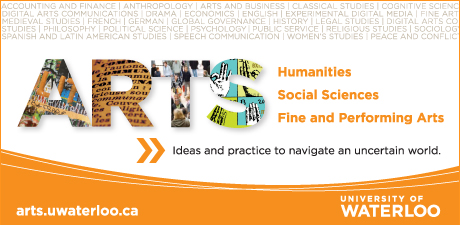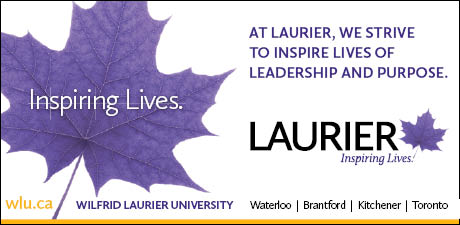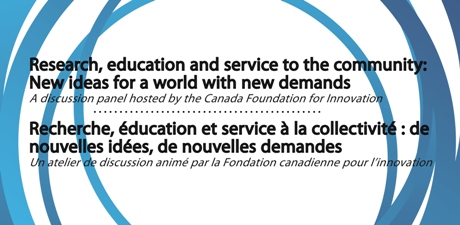Introducing the Congress 2012 co-chairs
Every year, the CFHSS team works closely with a chair from the host university to organize Congress. This year, we are lucky to have two dedicated co-chairs working with us, Douglas Peers of the University of Waterloo and Mike Carroll of Wilfrid Laurier University.
Douglas Peers (left) is the Dean of Arts at the University of Waterloo, as well as a professor in the history department. Before joining the University of Waterloo in July 2011, he was Dean of Graduate Studies and Associate Vice-President Graduate at York University. Michael Carroll (right) was appointed Dean of Arts at Wilfrid Laurier University in July 2010. Before that, he was in the Department of Sociology at the University of Western Ontario. There, he served as Chair in Sociology and President of the Faculty Association.
We asked our co-chairs a few questions about their hopes and expectations for Congress 2012 next spring. Here are their answers:
This year’s theme is Crossroads: Scholarship for an Uncertain World. What is it about the theme that resonates with you?
Douglas Peers: While each generation is often quick to assume that it is experiencing something totally unique, often pitched in terms of a standing at a precipice, few can doubt the massive changes that are facing higher education in general, and the humanities and social sciences more particularly. Some of these upheavals are due to funding cuts and enrolment pressures, still others from our efforts to engage with – even understand – what has come to be called a knowledge economy, but a good many others arise from the impact of new modes of collecting, analyzing and disseminating information. Technology is playing a major role in this but so too are the ever-shifting boundaries between and within disciplines. The convergence of Congress with its diversity of disciplines and researchers with the region of Waterloo, known for its innovation in the so-called information age, is ideally suited to exploring the many possible meanings and consequences associated with Crossroads.
Michael Carroll: “Crossroads” is an apt metaphor for this year’s Congress for at least two reasons. First, and most simply, it’s a term that connotes the gathering together in one place of people from a variety of locations and backgrounds, and so a place where divergent views can be exchanged in a single forum. But “crossroads” also refers to an important juncture, where travelers can choose to go off in a number of different directions. The world is indeed an uncertain place: old hierarchies are being challenged; processes of globalization, migration, armed conflict, environmental degradation, and government spending patterns, etc are re-shaping entire societies, and the academy itself is similarly engulfed by change. In this context, Congress 2012 will give scholars from the social sciences and the humanities the opportunity to gather and discuss issues important to their disciplines but will also provide the opportunity to discuss how we might–and should–respond to the changes that are reshaping our worlds.
What will be unique about holding Congress 2012 on your campuses?
DP: The most obvious unique attribute about holding Congress in Kitchener-Waterloo is the opportunity it affords of building upon the energies and complementary strengths of two universities, creating a situation in which the sum is clearly greater than the parts. In addition, the local commitment to and enthusiasm for scholarly enquiry, as evidenced by the Perimeter Institute , the Centre for International Governance Innovation, and the flourishing creative and performing arts communities, not only promises attendees a warm and receptive welcome but also creates fertile grounds for scholarly debate and exchange.
MC: That the Kitchener-Waterloo region is the fourth most popular destination for new Canadians is itself testament to the dynamic growth occurring in this region, and yet this will be the first time that Congress will be held here. It will also be one of the very few times that Congress has been sponsored by two local universities. Altogether, Congress 2012 will allow registrants to come to better understand the blend of the old and the new that is a daily experience in K-W and the surrounding area, and to familiarize themselves with Laurier (in our Centennial Year) and with the University of Waterloo. The fact that most Congress events will take place on Laurier’s Waterloo Campus will make for an especially collegial experience.
What are you most looking forward to about Congress 2012?
DP: Personally, what I am most looking forward to are the opportunities that Congress affords me to immerse myself in a series of stimulating conversations with scholars from diverse backgrounds. In the past I have always come away from Congress rejuvenated and re-energized, outfitted with new ways of thinking about questions arising in my own research, and an expanded list of fellow scholars with whom I wish to stay in contact.
MC: At one level, my strongest hope is that everything runs smoothly and as planned, and that attendees leave feeling they’ve enjoyed themselves. More selfishly, I look forward to seeing old friends, meeting new colleagues and hearing arguments that allow me to see the world in different ways.







